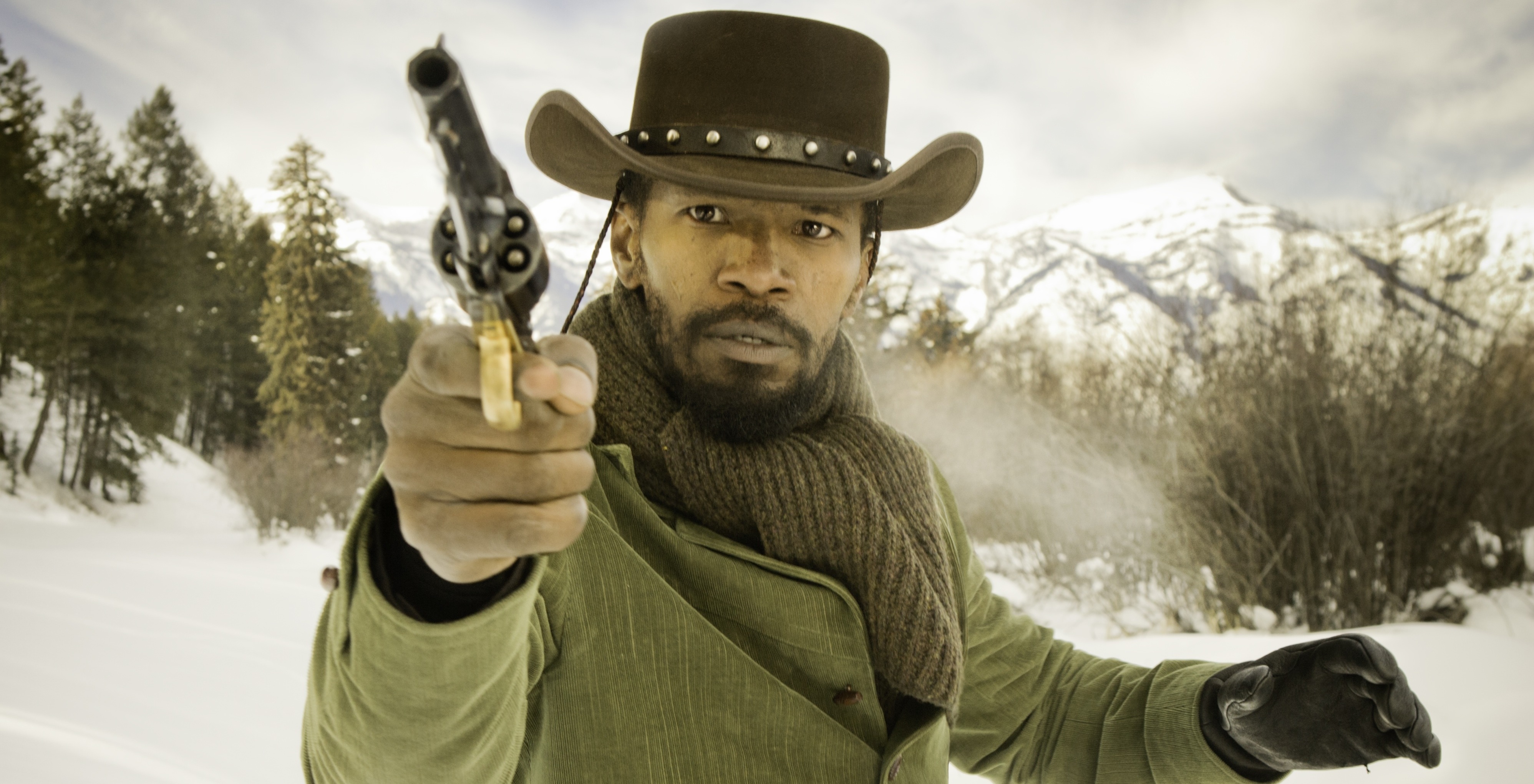
I saw “Django Unchained” a few weeks ago, before the Sandy Hook tragedy, and truth be told I hadn’t connected the the two until I sat down to write this review and began to think of the extreme violence present in this film. This is partly because of the gap in time between the two events, but also because I don’t believe that movies (or videogames or Marilyn Manson records) are to blame for someone like Adam Lanza committing the unspeakable crimes that he did. Yet there will be some who upon the film’s wide release bring the belabored and false point back to the foreground, which is a shame. It’s a shame that I even have to mention it. But I felt it worth noting.
Tarantino’s latest masterpiece centers on the titular Django (Jamie Foxx) and his bounty-hunting mentor, Dr. King Schultz. After freeing our hero to aid in a hunt for the men who sold his wife, Schultz—a foreigner and abhorrer of slavery—teaches the former slave his trade. Django proves particularly adept with a revolver and soon becomes skilled in Schultz’s other bizarre practices, chief among them the portrayal of various characters. As the two become friends, Schultz agrees to help Django find and rescue his wife.
What follows is classic Tarantino, an amalgamation of spaghetti western sensibilities, a new and old musical palette, and a whole lot of modern badassery. Tarantino provides some brilliant dialogue, delivered with incredible life. Waltz gleefully says his lines with an erudite flair, while Foxx tends to whisper, voice building as he gains confidence and plays into deceit. However, when it comes to dialogue, most publicity has centered around Tarantino’s heavy use of the word “nigger” throughout the film. I imagine detractor’s of the word’s many appearances in “Django” are the same people who try banning “Huckleberry Finn” from their schools, or worse, tell their kids to replace the word “nigger” with the word “brother” or some other word. (This actually happened in my Catholic high school.) Tarantino isn’t being derogatory here, nor is he being brave. What he is doing is facing the facts that this is how people talked in the south in the years before the Civil War and, in some places, to this day.
No question, there’s a thin line when dealing with that word or this kind of subject. But as with “Inglourious Basterds,” the subject matter also allows Tarantino a freedom to go all out. In 2012 America we do not care if a bunch of Nazis are burned alive in a movie theater by a Jewish woman orphaned by the Holocaust, nor do we care if a bunch of racist southern pricks of the era are gunned down by Django, a now free man. We call that just deserts. We are all for it. We root for Shosanna and Django. Kill the bastids! And while this does highlight a certain (American?) filmgoers desire for violence, we must remember that Tarantino’s movies are morality plays above all, and for many without the temperance of Gandhi or MLK, a bloody end is the only reward for a morally bankrupt life.
And like in “Inglourious” we at times are forced to think critically about the violence taking place and to whom it is leveraged against. The mark of any good film is that it makes you think, even when there’s an easy answer right in front of you. There were a couple times during “Django” when I was reminded of the love sick puppy dog/Nazi Fredrick Zoller in “Inglorious,” who despite killing hundreds of Allied soldiers, despite being a Nazi propagandist’s wet dream, doesn’t seem like such a bad guy—not that a direct equivalent character exists in “Django” (Stephen is difficult, but in a completely different way), only that there are challenges present here. Even in worlds we know are black and white, Tarantino finds a way to give us grey. And because “Django Unchained” is art and not reality, these difficult concepts are desirable. They help us navigate the real world, where issues of gun control and mental health, for example, are not so easy to pin down—and the film entertains while tackling these issues,which is no easy feat.
There’s no question Tarantino is one of the great American directors. There will be a contingent who label him racist and/or a breeder of violence, but Tarantino’s latest is an impressive entry for a director who could have called it quits a decade ago and still held legendary status. “Django Unchained” finds Tarantino reveling in his storytelling powers, in his ability to inspire, to horrify, to dazzle, to ooze cool, to make us laugh, to make us think and have a hell of a good time doing so.
